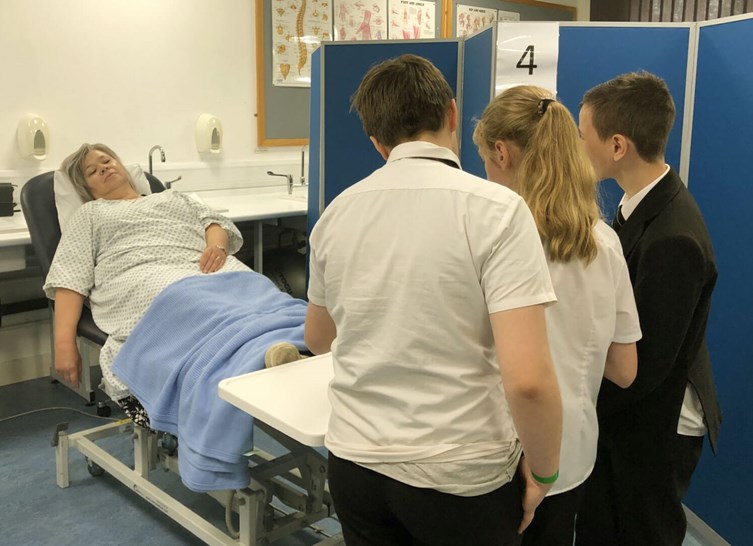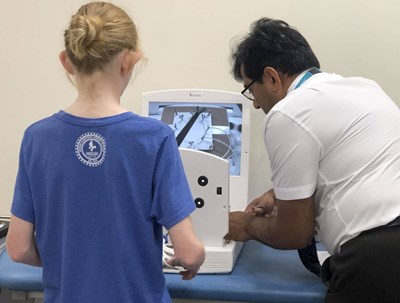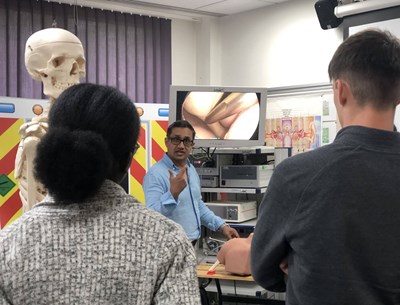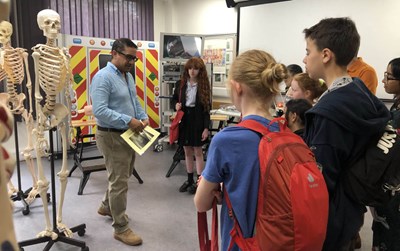
For the last five years, Professor Rahul Kanegaonkar has been running Medway Medical Fayres for children in Kent, UK. Free to attend, the fayres take place at Medway Campus of Canterbury Christ Church University and allow 12–13-year-olds from less affluent backgrounds to experience a breadth of medical specialties. Consultants support the event, sharing their knowledge of ophthalmology, ENT and anaesthetics.
Haseem Raja spoke to Prof Kanegaonkar to find out more.
We are really excited to hear about your educational initiative that aims to encourage children to pursue careers in healthcare and science. Before we get on to the specifics, can you tell us a bit about your background? Who inspired you into medicine? Why did ENT appeal to you specifically?
Although my parents are both doctors, it was Mr Gill at the Harvey Grammar School and Mr Edwards at Eltham College who really ignited my interest and passion for science. They both encouraged me to consider a career in medicine and Mr Edwards once took to me an open day at the Royal Society of Medicine. As a surgical specialty, ENT appealed to me because it really was the only part of the human body that I really understood! I was also incredibly fortunate to work for some amazing surgeons, such as Alec Fitzgerald O’Connor and David Golding-Wood who encouraged and motivated me but also made me question current practice especially in the field of balance.
Can you tell me more about your initiative of organising Medical Fayres for school children? What motivated you to start this project and how did the idea come about?
I work at Medway Maritime Hospital in Gillingham. Unfortunately, there are pockets of real deprivation in this region. I came to realise there were some really bright local schoolchildren who might, with just a little help, realise their potential if they were inspired in the same way I had been. As a result, I recruited friends and family, to run an annual event that might ignite the students’ interest in science and encourage them to perhaps pursue a career in medicine and the medically related fields: the Medway Medical Fayre.
 How do Medical Fayres provide an enriching experience for the participating children?
How do Medical Fayres provide an enriching experience for the participating children?
Each event involves the children circulating from one hands-on interactive station to another. One station might teach them how to make a 999 call and perform CPR, another led by Dipalee Durve from the Evelina London Children’s Hospital translates the physics that they are taught at school with real life radiology (how often did we ask ourselves why we needed to know something at school?). The respiratory station is led by Miss Audrey Najuko, who takes great delight in passing the flexible nasolaryngoscope in me, so the children can see my nasal cavity and larynx. The highlight of the day is most probably the simulated accident and emergency station where children spend a few minutes taking a history from a ‘patient’ to come to a diagnosis (we felt it was important that children realise communication skills are vital in what we do). The station is led by Miss Katherine Steele, who not only takes the students through the different emergencies (a diabetic hypoglycaemic episode, asthma attack, stroke and heart attack) but also their treatment. With the skills the children learn on the day we hope they would be able to help someone in distress and call for appropriate help.
You've emphasised that the students come from less affluent backgrounds. How do you ensure these children have access to the Medical Fayres and what kind of impact has this had on their perceptions and aspirations?
We have been fortunate to work with the outreach team at Canterbury Christ Church University. They contact local state schools who in turn offer the event to their pupils. Unfortunately, as places are limited (12 children to each school) the teachers do on occasion vet students according to their postcodes and hence specifically target those children from less affluent backgrounds. The perceptions and impact of the event has been incredibly positive for not only the children but also the teachers and parents who have on occasion attended. The vast majority of children leave the event with a genuine buzz and enthusiasm for studying the sciences and considering healthcare careers. We have had teachers in tears thanking us for helping their students.
 Funding such events can be challenging. How do you manage the financial aspects of organising these events, especially since you personally cover the costs?
Funding such events can be challenging. How do you manage the financial aspects of organising these events, especially since you personally cover the costs?
I am fortunate to work for Canterbury Christ Church University. The university has a genuine interest in helping the local community and hence offer the entire Medway campus for the event for one day each year. I am also grateful to Dr Susan Plummer, Director of the Institute of Medical Sciences, who provides support, staff and materials at no cost, and also to friends and colleagues who give up their free time to teach on the Medical Fayre. The last event was also supported by Mr Lee Aldridge, Chief Executive of the Spire Alexandra Hospital.
What is important to us all is that no school nor child should have to pay to attend the event. These children are from less affluent backgrounds and any charge might deter the very children we are hoping to help. Additional costs I cover personally, but I think this is the right thing to do. If we can transform the life of just one child per event, I think it would have been worth it.
Having successfully organised these educational events for five years now, what do you see as the long-term impact of this initiative, both on the students and the broader community?
I am pleased to say that since launching the event more schools are aware of the Medway Medical Fayre and encourage their students to attend. For the broader community and region, with the recent launch of the Kent and Medway Medical School, we sincerely hope this event will encourage students to pursue a career in medicine, train locally and practice within the region.
 Do you have any plans to expand the reach of the Medical Fayres or introduce new elements to further enhance the experience for the students?
Do you have any plans to expand the reach of the Medical Fayres or introduce new elements to further enhance the experience for the students?
This event has been so successful that we would hope that some of your readers might consider running similar events in their regions to support their local communities and children from disadvantaged backgrounds. Although each event is exhausting and time-consuming it is also incredibly rewarding for all those who participate. We would be more than happy to help facilitate these events and share the materials that we have already generated.
Given your busy work schedule, how do you manage to carve out time for relaxation, and what activities do you find enjoyable during these moments?
I have recently taken up woodworking as a hobby. This is both phenomenally rewarding and frustrating in equal measure. I have also had the occasional mishap. Having bought a mitre saw, I managed to cut off the end of my left index finger at, your readers will be pleased to read, a perfect 45-degree angle!
With the knowledge you have today, what advice would you give to yourself from a decade ago?
The advice I would give myself is that my role is to make the very best doctors of the people who I train. I have achieved all the things I have because of the kindness and support of so many people and I never forget that.



